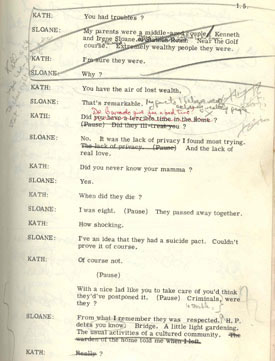|
|
|
| |
SLOANE
AND OEDIPUS - FOUNDLINGS AND SEX - 2 OF 2 |
| |
"I
find lust an emotion indistinguishable from anger."
(Orton's Diary, 26 July 1967)
In Wilde's The Importance of Being Earnest, Jack finds
that his fictional double life as 'John' and 'Ernest'
conforms to a reality he has never known (he was christened
'Ernest John'); Sloane's fictional self, prepared to give
out to his landlady and her brother, becomes Sloane's
real self when the two of them trap him into the image
he has adopted of the ambiguous dangerous man-child, as
portrayed by young turks James Dean and Marlon Brando
in the cinema of the 50s. Bisexual hooliganism is Sloane's
final fate, his Adonis beauty shallowly hiding his chameleon
nature. Self-invention sticks, as Orton was to find. Like
his young creations (Hal and Dennis in Loot, Nick in What
the Butler Saw, and Sloane), Orton managed two deliberate
cultural shifts in his inventive presentation of his life.
His autobiographical sketch for the programme for Sloane
in '64 shaved his age from thirty-one to twenty-five,
highlighted his working-class background, insisted on
his educational failure (no '11 plus' for young John),
revealed his time in prison and his time on the National
Assistance since, talked of marriage and divorce, and
finished with the disingenuous question, 'Is that enough?'
With this mixture of truth, fiction and lie, Orton demonstrated
that working-class autodidacts in the 60s could be every
bit as cultured, every bit as assured and knowing, as
those attending university. Further, by being photographed
in his uniform of leather jacket and white T-shirt he
showed that homosexuals need not conform to the stereotype
of being 'sensitive' (a euphemism at the time for 'homosexual'
and one which Ed denies), that tough masculinity was not
a preserve of the heterosexual. In Orton's dissection
of sexuality, compartments are not watertight; they leak
and slop their messy contents. Finally, it is impossible
to label Sloane and Ed as 'gay' or 'bisexual'; teasing
out the possibilities of either's sexual history is a
ticklish problem indeed.
Ed: Principles, boy, bleeding principles.
Orton's willingness to enact taboo material on stage and
readiness to be photographed staring impassively to camera
left the press in love with this new golden boy of the
British theatre. Headlines such as 'It's still Fish and
Chips for Joe Orton' or 'What Prison Did for This Playwright'
sound as though they might have been penned by Orton himself.
Self-conscious and contrived as his art is, it wriggles
with delight in the knowledge that it is up there with
the greats of the English tradition. His literary forebears
run along a line that includes Marlowe, Congreve, Austen,
Wilde, and the man he termed 'the master', Ronald Firbank.
Add to that the trash he read in prison while locked up
for twenty-three hours a day and you have the ingredients
of an arch manner that, like Sloane's sexuality, defies
labels.
Sloane: There are fascinating possibilities
in this situation. I'd get it down on paper if I were
you.
Questions of meta-theatricality aside, comic menace pulses
through Sloane. The possibilities of bad sex, bad behaviour,
bad background, bad upbringing, bad men, and one 'very
bad boy' gave Orton all he needed to make his 'first play'
an outrageous success, winning the London Critics' Variety
Award for Best Play of 1964. As one outraged member of
the public, Peter Pinnell, opined in the letters section
of the Daily Telegraph: 'Sir - In finding so much to praise
in Entertaining Mr Sloane, which seems to be nothing more
than a highly sensationalised, lurid, crude and over-dramatised
picture of life at its lowest, surely your dramatic critic
has taken leave of his senses. The effect this nauseating
work had on me was to make me want to fill my lungs with
some fresh, wholesome Leicester Square air. A distinguished
critic, if I quote him correctly, felt the sensation of
snakes swarming around his ankles while watching it.'
But Peter Pinnell, like so much else concerning Orton,
was a fiction. Orton wrote the letter himself.
|
|
|
